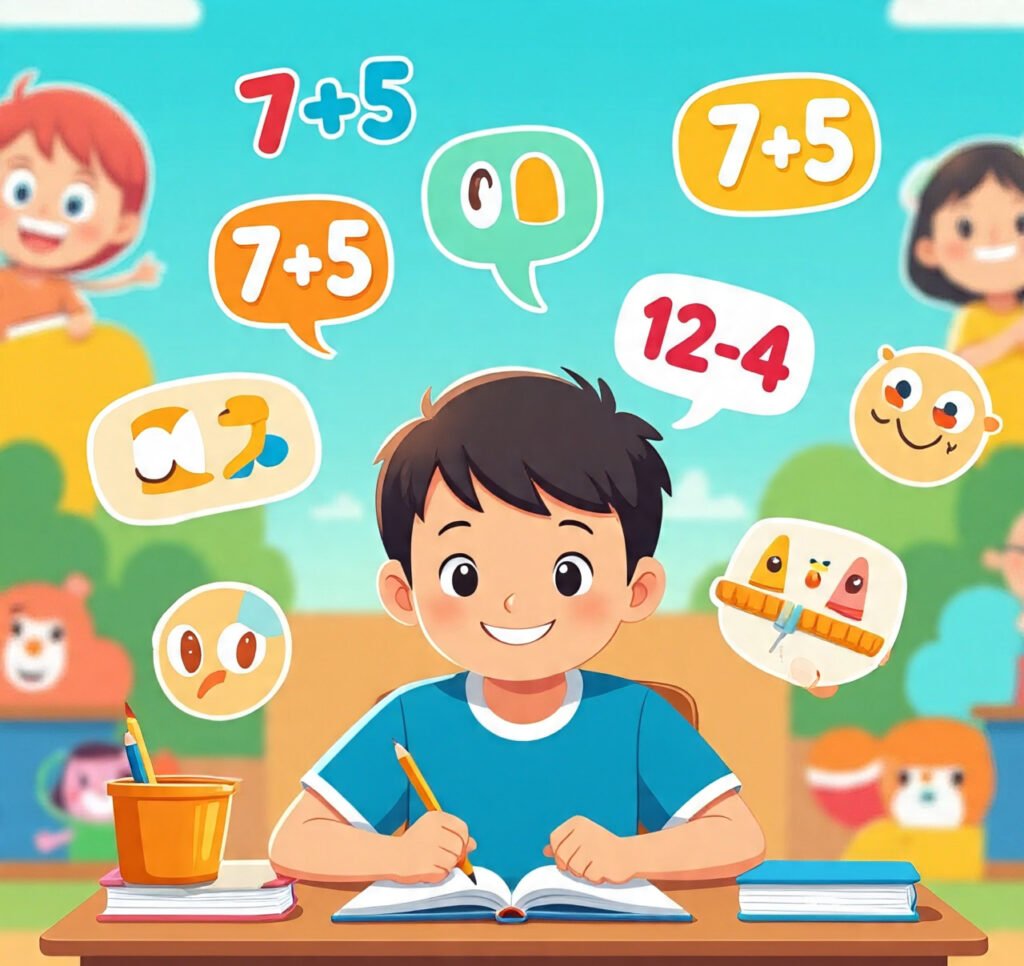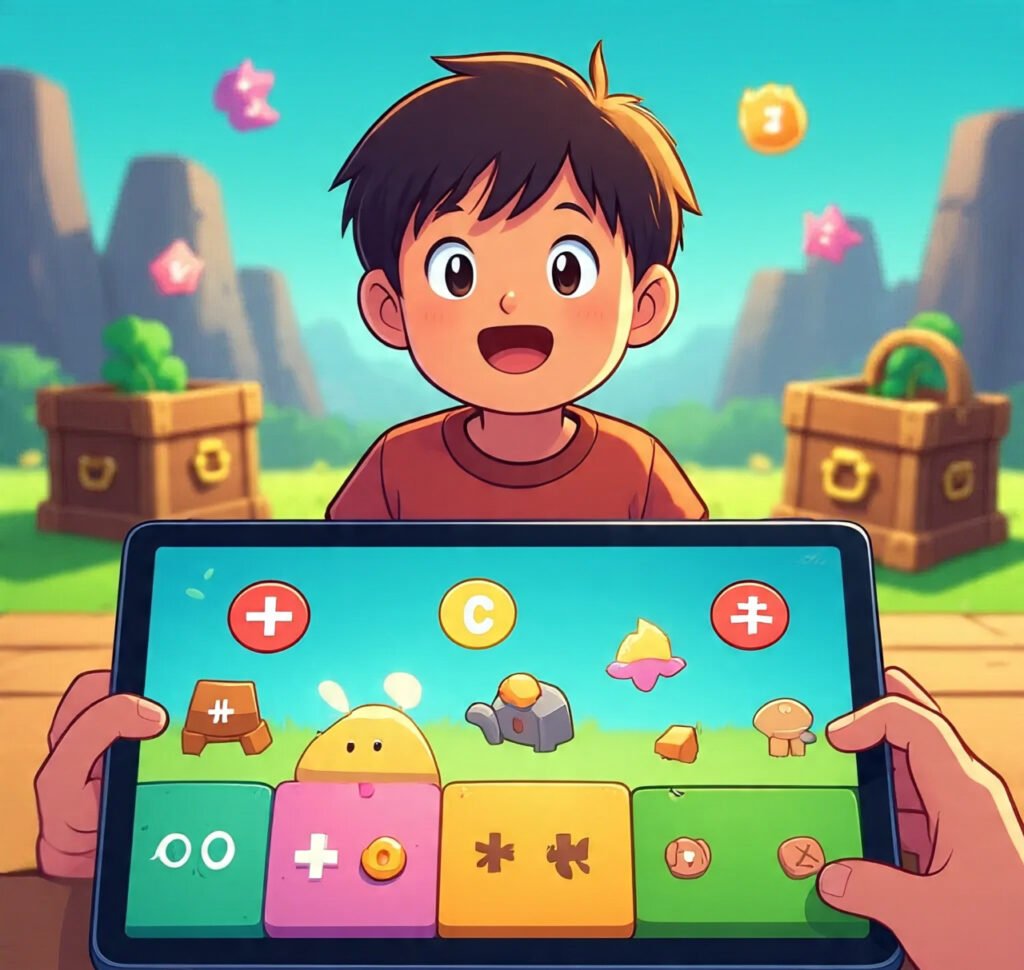Table of Contents

It was a quiet afternoon when Rahul’s mother saw him struggling with his homework.
He sat with his notebook open, pencils everywhere, and a confused look on his face.
Simple sums like 7 + 5 or 12 − 4 suddenly looked tricky!
She remembered how math sometimes made him frown and sigh. She wanted to help him enjoy learning again. That’s when she found online math games for addition and subtraction.
These games changed Rahul’s learning. Instead of feeling stressed about math, he started looking forward to practicing. But what makes these games so good? Why should parents try them for their kids?
Why Addition and Subtraction Can Be Hard
Many children find adding and subtracting tricky at first.
Old-style methods memorizing tables and doing the same problems over and over can get boring.

This can cause:
- Losing interest in math
- Difficulty learning harder concepts later
- Lower confidence in school tests
Parents often wonder: how can we make learning these skills fun and easy? That’s where online math games help.
How Free Online Math Games Help
Interactive games make learning fun. Unlike worksheets, these games let kids:

- Practice without stress – Kids can try again and again, which helps them remember better.
- Get instant feedback – They know right away if the answer is correct or not.
- See bright graphics and fun characters – Makes learning exciting and helps memory.
- Learn at their own speed – Start with easy sums like 2 + 3 and move to harder ones step by step.
Fun Math Game Ideas
Here are some popular free online math games for addition and subtraction:

- Number Matching Games
Match numbers with their sums or differences. For example, match 8 + 4 with 12. This makes learning fast and fun. - Timed Challenges
Solve problems against a timer. It adds excitement and improves focus. - Puzzle-Based Games
Solve math problems to complete puzzles or collect treasures. Learning feels like an adventure! - Drag-and-Drop Games
Move numbers to the right box. This builds hand-eye coordination and math skills together.
Benefits of Using Free Online Math Games

- Better Memory – Kids remember math longer because they learn while playing.
- More Confidence – Completing challenges and earning points makes kids proud.
- Less Math Anxiety – Fun games reduce fear and pressure.
- Learn Anywhere, Anytime – Great for busy schedules.
- Prepare for Harder Math – Mastering addition and subtraction helps with multiplication, division, and problem-solving.
Tips for Parents

- Set a Routine – 15–20 minutes a day keeps practice regular.
- Balance Screen Time – Games should complement, not replace, other learning.
- Play Together – Help your child and discuss solutions.
- Track Progress – Check scores to see what your child needs to work on.
- Celebrate Achievements – Reward success to make learning positive.
Common Misconceptions

- “Games are just for fun” → Actually, structured games improve skills and memory.
- “Only older kids benefit” → Even younger kids can learn addition and subtraction through games.
- “Screens distract kids” → Choosing educational games keeps learning the main focus.
Real-Life Example

Ananya, a 7-year-old, struggled with subtraction. After just one week of 15-minute math games, she solved problems confidently. Her errors dropped from 40% to less than 10%! Her teacher noticed faster, more accurate work and most importantly, Ananya started enjoying math.
Stories like these show that online math games are not just for fun they are powerful learning tools.
Choosing the Right Games
When picking games for addition and subtraction, parents should check:
- Age Suitability – Matches your child’s grade and level.
- Interactive Design – Animations, rewards, and challenges keep kids engaged.
- Adaptive Difficulty – Games get harder gradually to keep kids motivated.
- Progress Tracking – Parents can see how their child is doing.
Final Thoughts
Learning addition and subtraction doesn’t have to be boring.
online math games make learning fun, interactive, and confidence-boosting.
Parents can help kids practice essential math skills while playing. This builds love for learning and better performance in school.
For a trusted platform that combines fun and learning, FocusFun offers math games that make addition and subtraction exciting and effective for children.
FAQ’s
1. What are the best free online math games for addition and subtraction?
Some highly-recommended free online math resources for practicing addition and subtraction include Khan Academy, Cool Math Games, and Math Playground. Other popular and free options mentioned are Splash Learn and SumDog, which offer a variety of interactive games and activities designed to help build fluency with basic math facts.
2. Are free math games safe for children?
Math games provide a design and structure for youngsters to participate in critical thinking and arrive at a specific objective. In a game, kids can play alone or with a gathering, they can settle on their own choices about the moves they will make, and they can play again and again evaluating various methodologies.
3. Are there story-based math games for kids?
I would say that you could use the Khan Academy. There are various math educational games online.
For the original Nintendo and the Switch, you could have your child play Donkey Kong Jr. Math.
Lastly, try to play Monopoly or Super Mario Bros. Monopoly.
4. Do math games really improve confidence in school exams?

Experiencing panic attacks before math exams can be challenging, even if you enjoy and understand the subject. Develop a consistent study routine, practice regularly, and break down complex problems into manageable parts. Implement relaxation techniques, such as deep breathing, to manage anxiety before exams. Consider seeking support from a tutor or participating in study groups to enhance your understanding and build confidence. If panic attacks persist, consult with a mental health professional to explore strategies for addressing exam-related anxiety. Remember that seeking help is a proactive step towards improving your overall academic experience.
5. What features should I look for in a good math game for kids?
Something that’s fun but also teaches math principles at the same time. Maybe something with a story, but is very interactive and engaging. I think it’s important that kids understand why these concepts are important and how to use them in real life. I think it would be great to have something that can be done cooperatively as well, as math can often be more fun when it’s done together.
6. Why are math games effective for children?
Math games provide a design and structure for youngsters to participate in critical thinking and arrive at a specific objective. In a game, kids can play alone or with a gathering, they can settle on their own choices about the moves they will make, and they can play again and again evaluating various methodologies.
With the help of Math Games, kids are building their certainty as issue solvers and rehearsing significant social-enthusiastic abilities. These games in the preschool give instructors the chance to acquire bits of knowledge into children creating numerical reasoning.
7. Can playing online math games help children with learning difficulties?

Yes, online math games can help children with learning difficulties by making math fun and engaging, which improves their problem-solving skills, logical thinking, and ability to learn new concepts. These games make abstract mathematical ideas more concrete, and through repetitive practice, can help children improve their core mathematical skills, memory, and overall academic performance.
8. Can online math games help children who struggle with subtraction?
Yes. FocusFun’s subtraction games are designed with gradual difficulty levels and interactive challenges, helping children understand and practice subtraction step by step, building confidence and accuracy.
9. Are there math games suitable for grade 1 and grade 2 children?
Yes! FocusFun offers games tailored for Grade 1 and Grade 2 students, covering addition, subtraction, and other foundational math skills. The games are age-appropriate, interactive, and designed to make learning fun and engaging.
10. How do drag-and-drop math games improve learning?
FocusFun’s drag-and-drop online math games allow children to move numbers or objects to the correct place, reinforcing addition and subtraction concepts. This interactive method improves hand-eye coordination, memory retention, and problem-solving skills while keeping learning playful.
